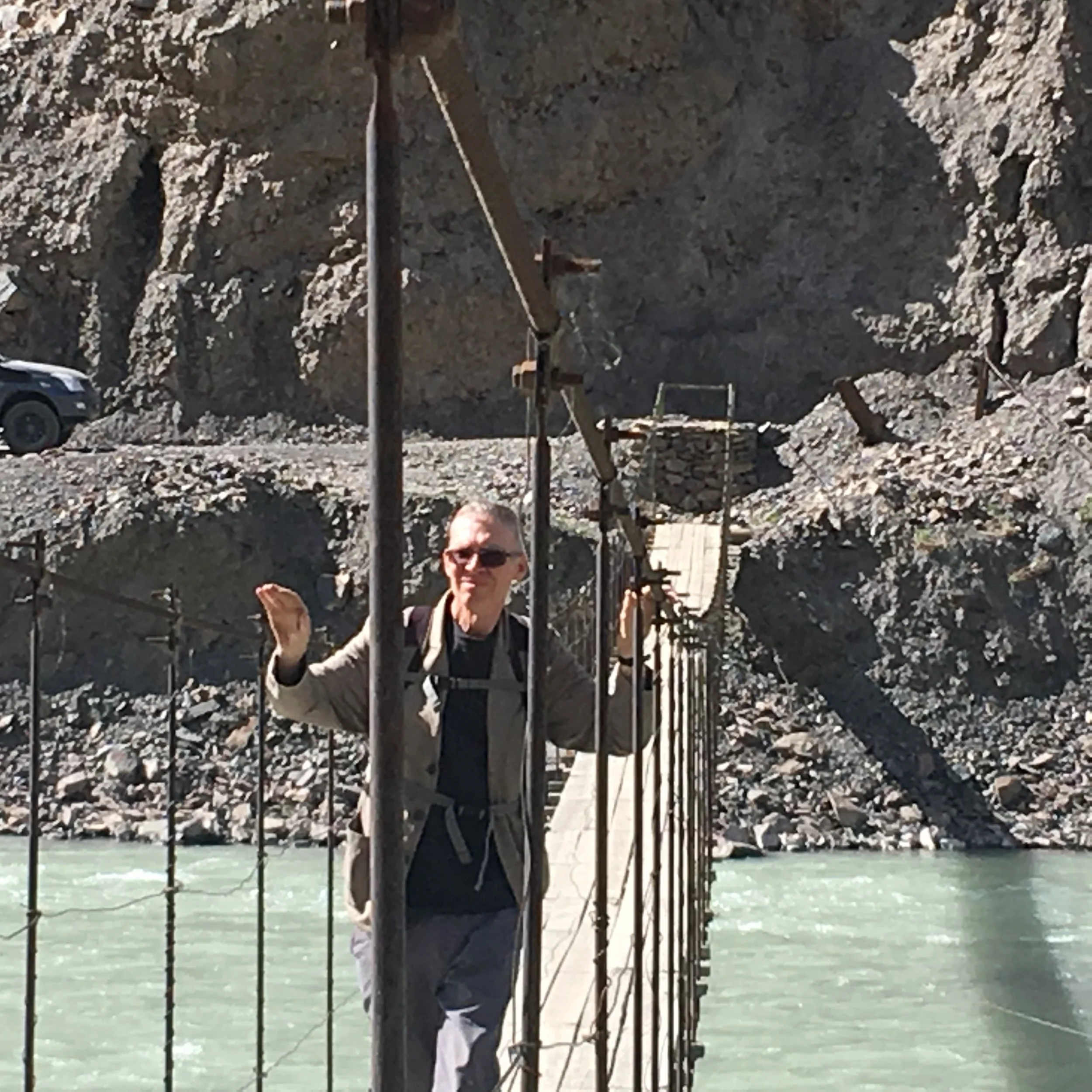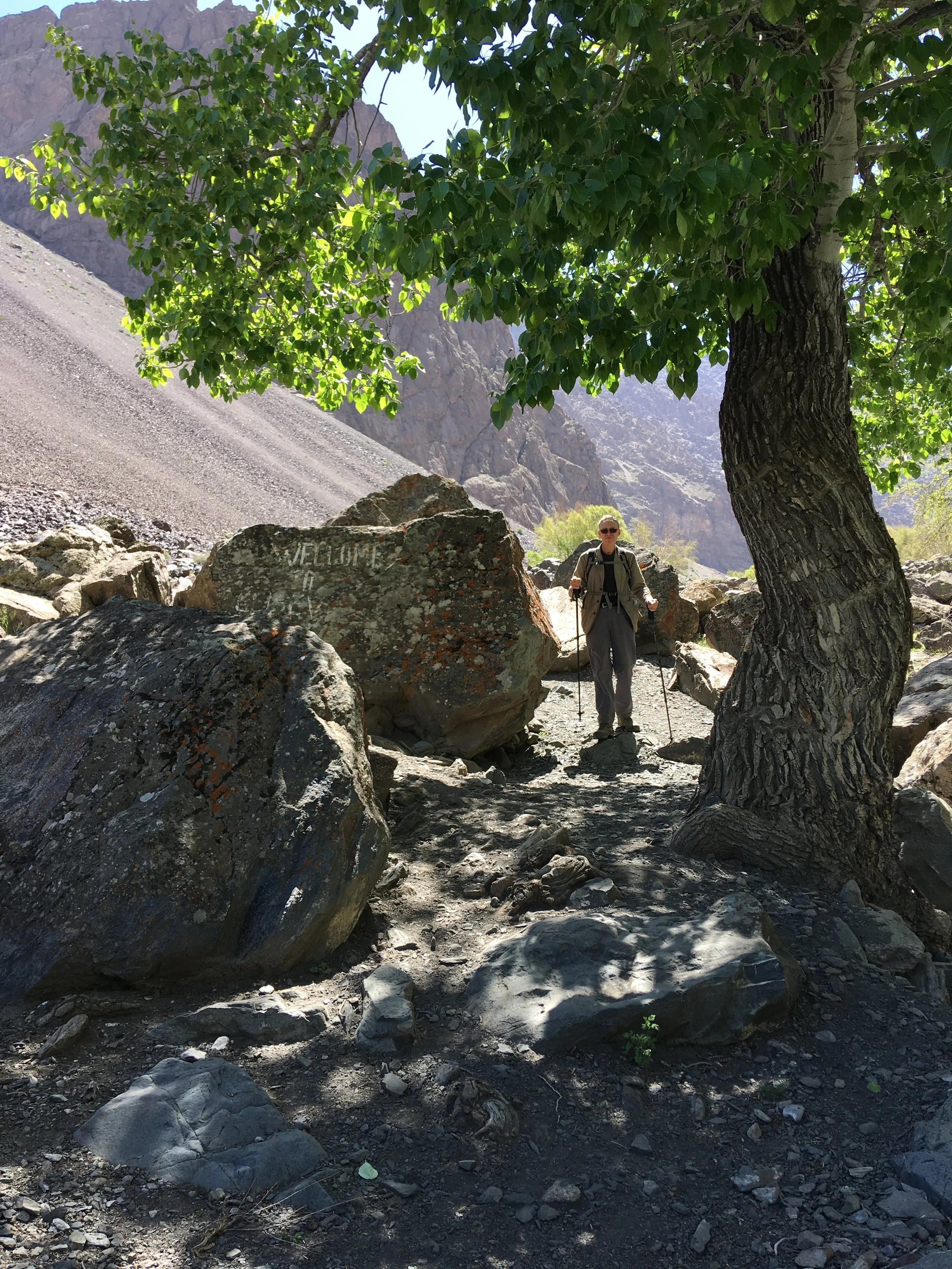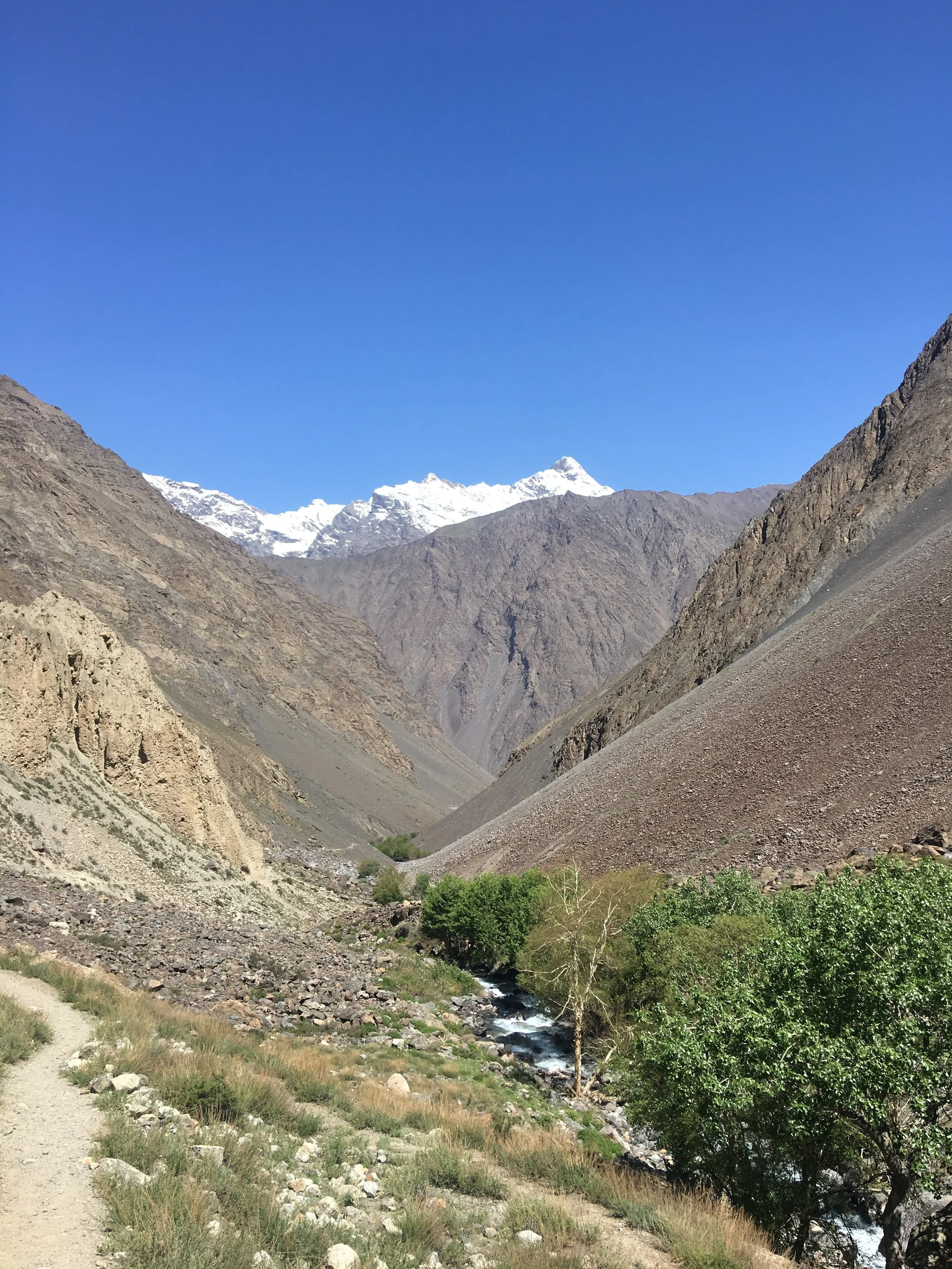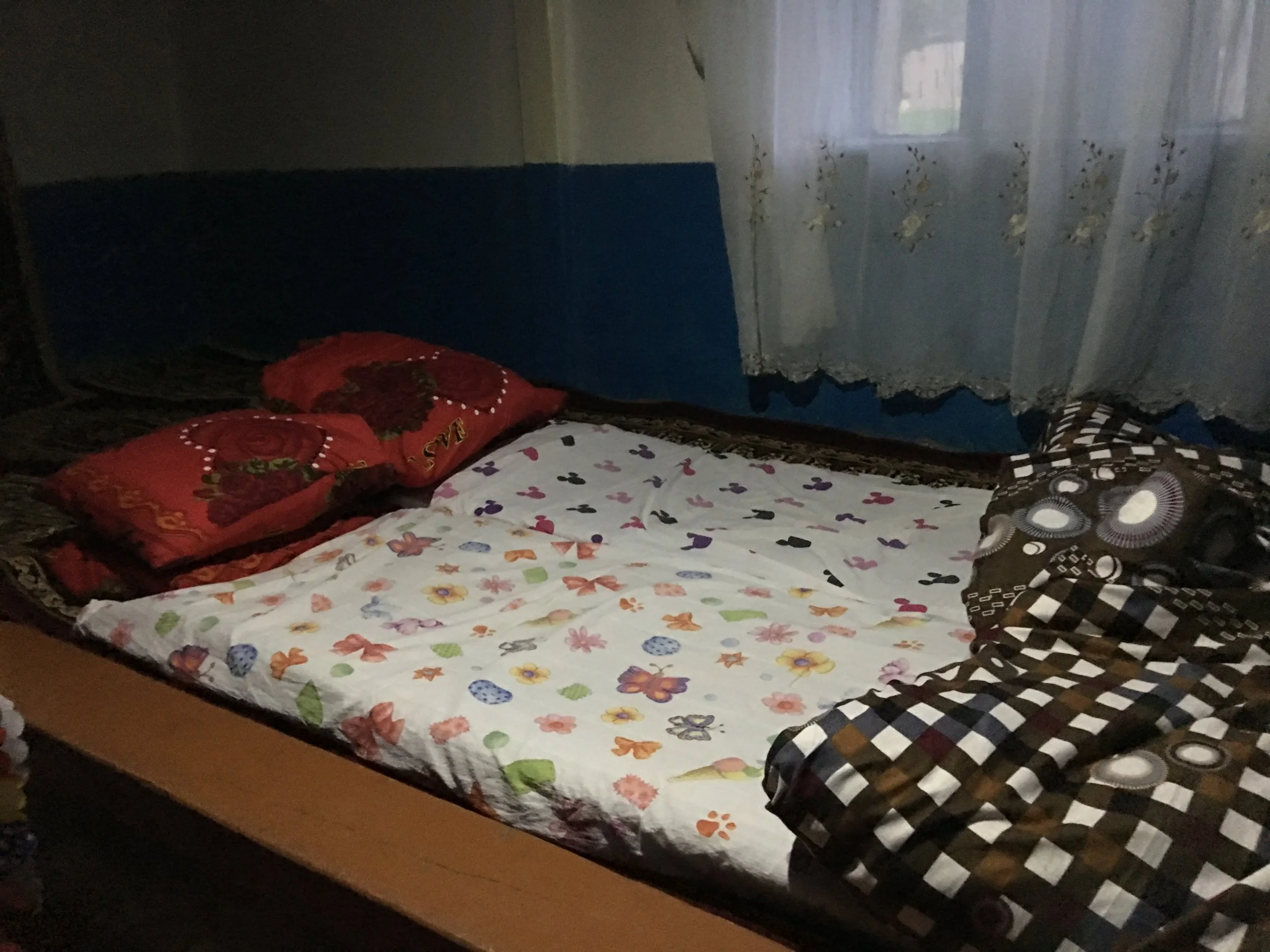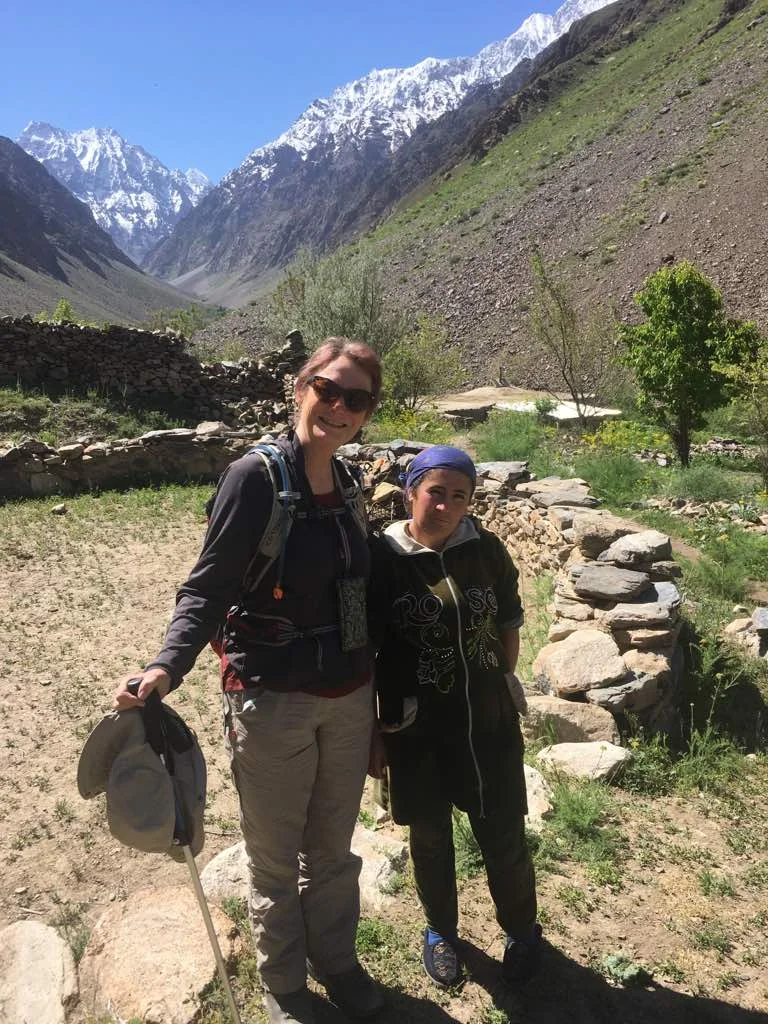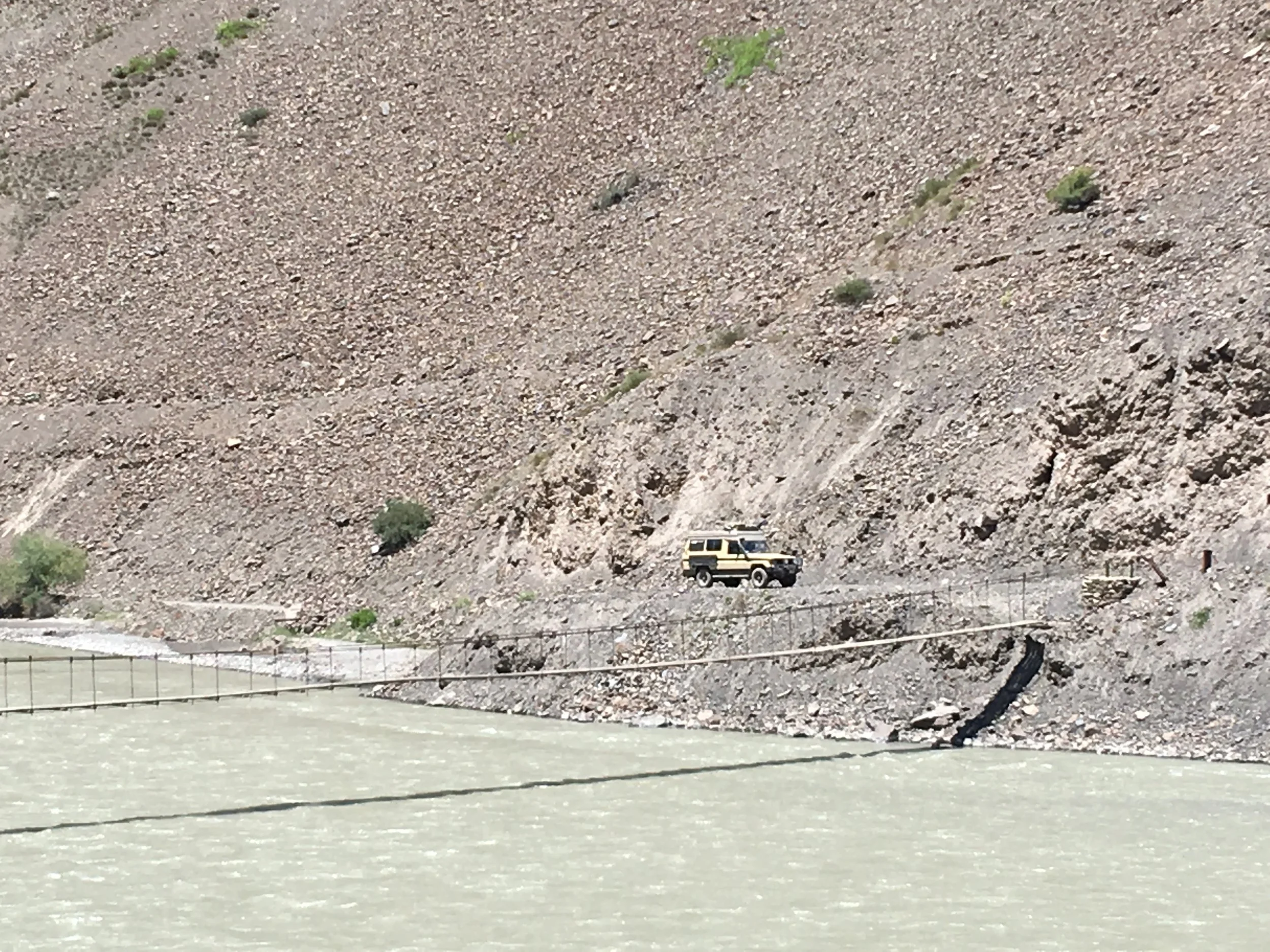We were 40 kilometres passed Kalaikumb when we set off again down the M41 Pamir Highway in the direction of Khorog. The plan, such as it was, was to drive around 130 kms to the entrance of the Bartang Valley and to take a detour up the valley to see what we might find. The speed we were averaging along the very rough roads was little more than 30kms/h. So we followed the Oxus/Panj river valley and spent a lot of the day peering over the river into Afghanistan to Jim’s oft repeated refrain of ‘a young guy could easily swim over to the other side or at a push could wade over’. The only thing was, that there was nothing much there to cross over for. From time to time there were people wading in the river with fishing rods (wood and string) on both sides. On the Tajik side, we learnt that these people in Gorno-Badakhshan, barely thought of themselves as Tajik and described themselves as Pamiri with their own language. The Afghan Pamiris spoke the same language as they did so they identified with them, even though there had been, and probably still are some tensions over the river border. (Sniper fire the previous day from the Tajik side).
We stopped in Rushon to buy bread for our late lunch and then drove on up the Bartang Valley. The story was not all about the roads today as the valley had opened up a bit and although the road surfaces were crap, the roads were less narrow and challenging. The road up the Bartang actually was fairly pothole free for several kilometres which was a pleasant respite from the bone shaking thumping along that we were getting accustomed to. (Just as well we have our German Scheel seats). After an hour or so driving up the valley and through lovely tree lined villages and amazing canal systems for irrigation, we passed a couple of footbridges over the Bartang river.
Alongside one bridge we spied a parked Landcruiser belonging to a Swiss couple we had chatted to in the Hello Dushanbe Hostel. We then pulled up and decided to take a walk over the wobbly footbridge to the other side of the fast flowing river and to see whether we could walk up the valley a bit.
A village (Jizew) was signposted 7kms up and maybe we would spot them coming down. Whilst we we’re getting kitted up with boots, sticks and water some local people stopped their vehicle alongside (as they do) and told us that there was a good homestay up the valley which we could reach. So a plan was hatched. It was 3.40pm when we set off and we reckoned we could get there easily before sunset and we were told it would take two to three hours. I don’t think I had reckoned on the extent of uphill slog involved at pretty high altitude from the off. When we did meet the Swiss couple hiking down they told us we had the best part of 800 metres to climb!
We were both pretty tired when we approached the ‘village’ and we pushed on because we did not want to be relying on head torches when the sun went down. In fact we were having a rest when Gulshah from Jizew, came down the track with a spade slung over his shoulder and told us his homestay was only another 5 minutes to go, passed a couple of wheat pastures and vegetable plots tucked in alongside the rocks and above the fast flowing stream. He tore up ahead to get the kettle on and to prepare the family for guests.
This story really does no justice to the scenary which was truly awesome. As we trudged up the valley, initially along an empty riverbed, alternately through trees and scree ever upwards we were largely in the shade following the retreating sunlight up the valley until we arrived at the very tiny cluster of adobe flat roofed mud huts. At that point the valley sides had darkened and the sun still poured down on the snow covered peaks at the end of the valley ahead of us. It was really dramatic.
On arrival two women were washing clothes with water from a tiny stream or irrigation channel just above their house. There was an outdoor cooking area, a covered sitting area and bench seats and a cluster of other small buildings accommodating goats and chickens and three donkeys grazing out the back. Two very young children were playing outdoors and a grandmother walked around with a younger infant in her arms.
Within minutes our boots were off and we were seated in the covered area on colourful carpets and cushions at our back with LOVE logos on them. A table cloth was spread in front of us and a tray of nuts, sweets and tea appeared in a fancy blue patterned china teapot. We were then brought steaming bowls of potato soup and great doorstop chunks of homemade bread.
When we were finished, the light was still holding out and we wandered around to see what was happening. I found one of the women with the goats. The mummy goats were penned separately from their young who were prevented from reaching the nannies! A lot of bleating and racket was involved. Armed with a bucket our hostess went systematically around 5 nanny goats and milked them from two teats each. This generated about a third of a bucket of milk which I was told was for my breakfast! The young were then reunited with the nanny goats and shut away for the night and the young had their fill from the unmilked teats.
There were no roads up to this village or the two further villages up the valley. There was also no electricity although a solar panel or two seemed to run a couple of batteries and mobile phones, possibly a couple of light bulbs could be charged and a satellite dish sat on one of the small roofs. This was the subsistence existence of 14 families, comprising 85 people in theee villages. The only cash coming in would be from each village homestay and one of the women was trying to sell tea from a large black kettle to any hikers that might walk up the valley or perhaps to guys who were maintaining the track to ensure that donkeys could carry produce and supplies up to the families as required. Her round trip would have taken four hours a day to sell half a dozen cups of tea! The children of the family would be sent away to a Russian built boarding school as the daily hike up and down the valley and then a bus ride to the nearest school would be impossible, particularly in winter. Three of the young people from the villages were now in college. Winter is bitterly cold and wild animals such as wolves or wild cats come down looking for food. Gulshah told us his favourite dog had been strong and could ward off one wolf but following an initial attack the wolf had returned with a mate and the pair had killed his beloved dog. He said that Tigers only came down from the high peaks occasionally in winter in an attempt to steal livestock to eat.
We slept that night in a large communal homestay room, and bed rolls were laid out on boards for us and heavy duvets were provided and pillows.
There was only an outdoor hanging bucket with a tap to wash under with cold water from the stream and higher up away from the houses a shed containing boards with two holes for the necessaries. (What an effort in winter in snow when the weather can reach minus 20 degrees).
Breakfast consisted of green tea and large goaty bowls of cream of wheat or semolina and omelets and doorstops of bread, cherry jams and the sweets, nuts and biscuits were brought out again and laid on a cloth in the sitting area. Tables and chairs for eating are a rarity here, as they have been since we reached Iran. (Jim and I generally gravitate to tables in cafes when we are given a choice between platforms with cushions or a table with chairs. I do find it easier to eat when the food is a bit closer and you are not trying to sit cross legged!)
Darshah and Rose had had their marriage arranged by their parents. She came from another Bartang valley village and the match was arranged over the phone by the parents. They had met twice before the marriage but I doubt there were any surprises. Her sister had joined them in Jizew and the impression was of a well run set up with 135 years of tradition in these particular villages which had been inhabited by his family and his forefathers over that period.
We were charged $5 each for this welcome and we doubled it before we left for the downhill trek which took us nearly three hours. As we left the family continued with their chores and we passed our hostess Rose watering her seedlings with water from the stream.
We were delighted to find Landy still waiting patiently for us in the lay-by at the bottom of the valley across the wobbly bridge and once we had removed our boots, we set off to reach a Khorog homestay for that evening as we were much in need of a shower!

